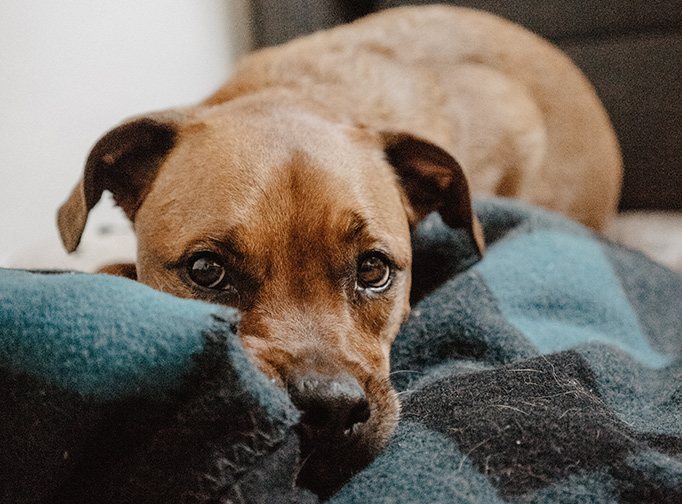
The ingestion of cannabis in any form can cause serious intoxication in small pets. Dogs are particularly attracted to the butts of joints found on the ground, or the butter or residue left behind when cooking using cannabis. Even inhaling second-hand smoke, in sufficient quantities, could cause some level of intoxication, but the most frequent incidents of intoxication in companion animals are from ingestion of a marijuana product.
Naturally, dogs often eat whatever they may find on the ground in the house or outside. This makes them more at risk than cats, who tend to be more selective about what they consume. However, all pets, if they ingest enough THC (tetrahydrocannabinol, the principal psychoactive ingredient) in proportion to their body weight, may exhibit signs of intoxication. We have even treated parakeets for intoxication by cannabis.
Clinical Signs of Intoxication in Dogs
Lethargy, drowsiness, haggard appearance, weakness to the point of being unable to stand, ataxia (unstable walking), increased or decreased heart rate, uncontrolled urination, sometimes while still sitting, hyperesthesia (exaggerated reaction to stimuli), and vomiting are some of the signs to look for. The intensity of the symptoms vary in function of the pet’s size and weight. Loss of consciousness and convulsions are also possible. To date there have been no deaths reported in the literature, but this is always a possibility, particularly in birds that have consumed a large quantity of the drug.
Since the legalization of cannabis, it is important for pet owners to be informed of the possible side-effects and the dangers of intoxication in their animals. If you think there is a chance your pet has ingested a cannabis product, seek help immediately from a veterinarian and be forthright about your concerns. Do not hesitate to mention that there is cannabis in your home and that your pet could potentially have been exposed to it. This will help the veterinarian to quickly determine a cause of your pet’s symptoms and make rapid choices for treatment.
For example, if your dog has ingested cannabis within the past 2 hours, the veterinarian may quickly and purposefully cause your pet to vomit in order to reduce the absorption of THC. If he has already begun to show signs of intoxication, intravenous fluids will be administered to support the patient, activated charcoal will be used to reduce the absorption of toxins, and vital signs will be monitored for several hours in-clinic. Hospitalization is sometimes required.
Concealing the possibility that your pet was exposed to cannabis will only prolong the diagnosis and may lead to pointless investigation and tests. If the clinical signs point to intoxication by cannabis, supportive care can be put in place immediately, without having to do other diagnostic testing. Most patients will recover after a few hours of intensive care.
Unfortunately, a dog could ingest the butt end of a joint in a public park without your knowledge, which makes the diagnosis more difficult. Consumers of cannabis products should be aware of their social responsibility to the community as a whole, by always disposing of their leftovers in a safe way, thereby limiting the risk to family pets and wildlife. Even consuming cannabis products at home presents some risk to pets if the products are not carefully stored away, with leftovers disposed of in a mindful manner.
Many of the cases of intoxication by cannabis treated at our hospital occur after a teenage house party, in which butts of marijuana cigarettes have been left behind and consumed by the family pet. When the family dog is rushed to the hospital, suffering from symptoms of intoxication, not only do the parents find out that their children are consuming marijuana, but they have to pay a hefty vet fee. This typical scenario may open an important family discussion with young people about the seriousness of drug use and the possible dangers to animals and ways to lessen the risks.
In March 2018, the Association of Veterinary Medicine of Quebec published an article mentioning that cannabis was the third leading cause of intoxication in dogs in Quebec in 2017 (31% chocolate, 25.7% prescription medication and 17.6% cannabis). This estimates that over 1000 dogs were intoxicated by cannabis in Quebec in 2017. With the legalization of cannabis, this number could quadruple, if we follow in the footsteps of Colorado where dog intoxications have quadrupled in the 5 years since legalization.
